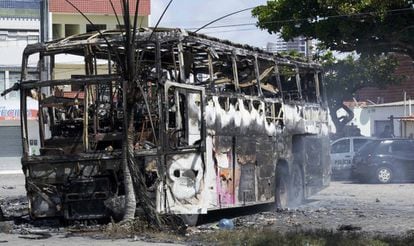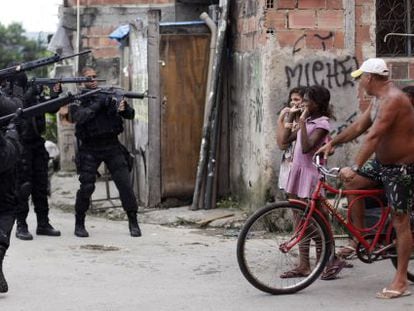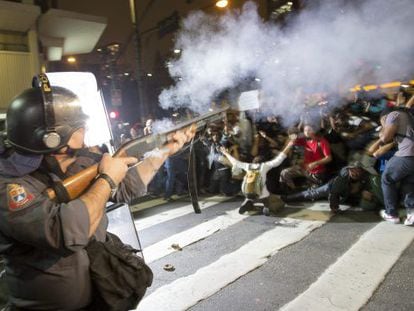Brazil sends 1,200 soldiers to deal with prison-related violence in north of country
More than 80 incidents reported over the last four days

As security concerns mount ahead of the opening ceremony of the Rio Olympic Games on Friday, Brazil’s northeastern Rio Grande do Norte has been hit by a wave of violence since July 29.
In just four days, some 80 incidents have taken place ranging from torched buses, attacks on public buildings and private property, and even a fire on one of the region’s most famous beaches, in the state capital of Natal. The central government has responded by saying it is to send 1,200 soldiers this week.
The state government says the decision to block cellphone signals in the Parnamirim jail could be the reason for the disturbances. In recent days, a number of messages have appeared on social networks warning that “any kind of blocking” would “make the whole state shake.”
In March 2015, Río Grande do Norte declared a state of emergency in its prisons. Since the beginning of the year, almost 300 prisoners have escaped
Due to the violence, which has begun at nightfall, the transport system in Natal was shut down on Sunday. On Monday a limited service resumed, patrolled by armed police. Schools and some shops closed on Monday. There have also been a number mass jailbreaks. In the early hours of Monday, 14 prisoners escaped from the Ribeira provisional detention center in Natal.
Authorities say that 68 people have been arrested for their involvement in the disturbances, among them one of the heads of the so-called Crime Syndicate, which is believed to be behind the attacks. The public prosecutor’s office in Río Grande do Norte says that the Crime Syndicate is an offshoot of the First Commando of the Capital (PCC), a gang that controls organized crime in São Paulo and other Brazilian states. This year, the group, which controls drug trafficking in the area, was the target of Operation Alcateia, aimed at dismantling the criminal networks that run the state’s jails.
Robinson Faria, the state governor of Río Grande do Norte, admitted on Monday that the state was exposed and that the full extent of the violence was still not clear. But the problems in state’s jails date back many years. In March, Cristiano Feitosa, a former justice secretary in Río Grando do Norte, told local media that the state’s prisons had a capacity of 3,500, but that the current number of prisoners being held in them was 7,500. He recommended blocking cellphone signals as the first step to dealing with the problems in the state’s jails.
In March 2015, Río Grande do Norte declared a state of emergency in its prisons. Since the beginning of the year, almost 300 prisoners have escaped, and according to sources within the penitentiary system, a number of prisoners have the run of their jails. According to official figures, more than 10% of murders in Rio Grande do Norte are linked to the penitentiary system.
English version by Nick Lyne.
Sign up for our newsletter
EL PAÍS English Edition has launched a weekly newsletter. Sign up today to receive a selection of our best stories in your inbox every Saturday morning. For full details about how to subscribe, click here












































